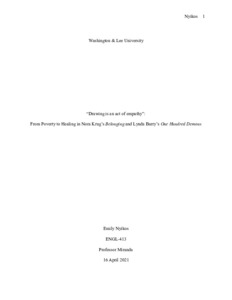"Drawing is an act of empathy": From Poverty to Healing in Nora Krug's Belonging and Lynda Barry's One Hundred Demons

View/
Author
Nyikos, Emily
Subject
Washington and Lee University -- Capstone in English
Krug, Nora
Barry, Lynda, 1956-
Poverty in literature
Healing in literature
Metadata
Show full item recordDescription
Emily Nyikos is a member of the Class of 2021 of Washington and Lee University. Capstone; [FULL-TEXT FREELY AVAILABLE ONLINE] If a hybrid were a plant, it would be a grafted tree, where blossoms from old wounds grow together to produce an entirely new fruit (Antonetta xxiv, xxvi, xxxiii). This is a visual representation of the healing process that artists experience in creating hybrid works. German illustrator Nora Krug and Filipina cartoonist Lynda Barry come from different backgrounds, but both suffer from psychological impoverishment. As a multifaceted problem, poverty requires a multifaceted approach to healing. The kaleidoscopic nature of the hybrid literary genre allows Krug and Barry to explore a variety of meaning-making forms which enrich their respective memoirs while helping them heal. In Nora Krug's Belonging: A German Reckons with History and Home, and Lynda Barry's One Hundred Demons, hybridity is a tool of investigation, play, and restoration through which both creators overcome their experiences of poverty and share their stories with wisdom and empathy. [From introductory section] Emily Nyikos